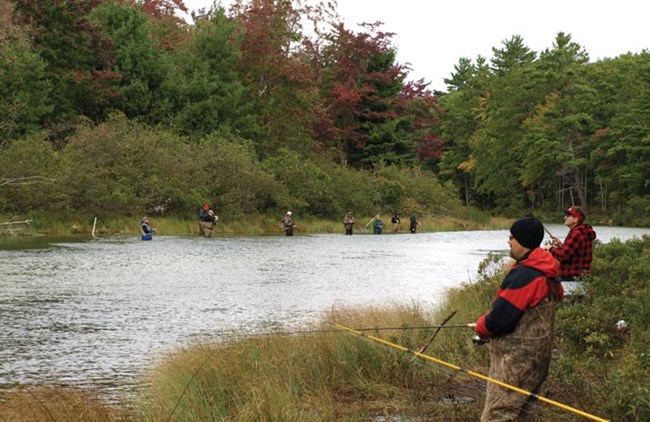|
Visit our keyboard shortcuts docs for details
Tips and tricks on how you can become a safe and successful Junior Ranger Angler. 
What comes to mind when you think about fishing? Patience, relaxation, challenge, and memories are often associated with fishing. You will find all that and a sense of stewardship, conservation, and preservation on this page. We want you to have an enjoyable time during your visit, and for those who come after you to fish. Take time to explore, learn what the park has to offer and learn your responsibilities before casting a line or flicking a fly. Sleeping Bear Dunes National Lakeshore allows fishing as a means of providing for public enjoyment, and customary and traditional use, and regulates fishing to ensure that it is managed in a manner that avoids unacceptable impacts to park resources. Junior Ranger AnglerFishing is a great way to enjoy the park and enjoy the outdoors. It is a fun activity that can be done at any age. Check out our calendar for Junior Ranger Angler events like pop-can fishing and more! Visit Junior Ranger Let's Go Fishing! - Fish & Fishing (U.S. National Park Service) (nps.gov) to find parks with fish, check on regulations, and more. Also check out our video below for some tips and tricks on how you can be a safe and successful Junior Ranger Angler. LicensesA valid Michigan fishing license is required to fish in the park, and fees vary. Children under 17 years of age do not require a license. Visitors fishing within Sleeping Bear Dunes National Lakeshore must follow the fishing license requirements in accordance with the laws and regulations of the Michigan Department of Natural Resources. RegulationsUnless otherwise provided for, fishing regulations apply to all finfish found in the park. Other taxa, including amphibians, mollusks and crustaceans (e.g. waterdogs, crayfish) are not considered “fish” for the purpose of NPS fishing regulations and are addressed by NPS regulations governing “wildlife” (36CFR2.2). These fishing regulations apply, regardless of land ownership, on all lands and waters within the park that are under the legislative jurisdiction of the United States. Fishing regulations for Sleeping Bear Dunes National Lakeshore follow those set by the State of Michigan (36CFR7). However, commercial fishing methods allowed under State law are not included within the scope of this authorization. For state fishing regulations, please visit the Michigan Department of Natural Resources website. For more information on how NPS fishing regulations work, go to the regulations page on the NPS Fish and Fishing website (https://www.nps.gov/subjects/fishing/how-regulations-work.htm). The following are prohibited, as per National Park Service natural resource protection regulations:
The following additional regulations apply only within Sleeping Bear Dunes National Lakeshore:
Where to FishThere are several small inland lakes to fish in the Lakeshore. On the southern part of the park, you will find Loon Lake along the Platte River. There is a boat launch just off M-22 for Loon Lake. Otter Lake is near Trail's End road, but the boat launch is made for canoes and will not accomodate trailers. On the northern end of the park, Bass Lake and School Lake offer good fishing. There is a boat launch for School Lake on County Rd. 669. For some excellent small mouth bass fishing, try Lake Manitou on North Manitou Island. The island has some additional fishing regulations: artificial lure only and 18 inch minimum size. Ice FishingIce fishing is popular throughout the Lakeshore during the winter months. The use of a powered ice auger requires a permit, and they are only allowed on Lake Michigan, Loon Lake, School Lake, Bass Lake (Leelanau County) and Tucker Lake. Pick up your free ice auger permit from the visitor center in Empire or from any law enforcement park ranger. Fish Consumption Advisories in National Park WatersThe Environmental Protection Agency, states, territories, and tribes provide advice on fish and shellfish caught in the waters in their jurisdiction to help people make informed decisions about eating fish. Advisories are recommendations to limit your consumption of, or avoid eating entirely, certain species of fish or shellfish from specific bodies of water due to chemical or biological contamination. To learn more about this topic, the National Park Service maintains information about Fish Consumption Advisories and Mercury and Toxins in Nature. Aquatic Invasive SpeciesImagine your favorite fishing spot and the wonderful memories. Things may look fine but underneath the surface there is a serious threat. Everything you remembered is now cemented together in a sharp, smelly mess. Invaders have wiped out the fish species you used to catch. How You Can Help – Stop Aquatic HitchhikersFishing Throughout the National Park ServiceWe invite you to visit the Fish and Fishing website for more information about fish and fishing in the National Park Service. You will learn about conservation, different fish species, and parks that offer fishing. 
NPS Photo |
Last updated: October 6, 2022
